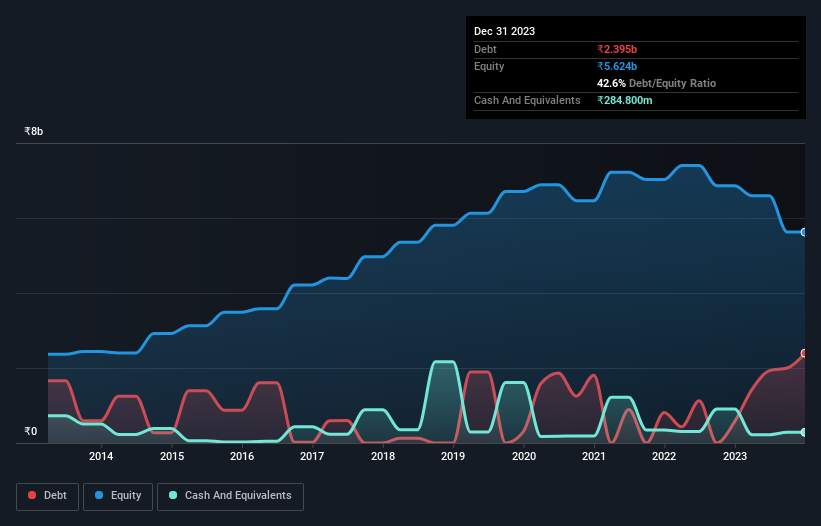- India
- /
- Consumer Durables
- /
- NSEI:JCHAC
Is Johnson Controls-Hitachi Air Conditioning India (NSE:JCHAC) A Risky Investment?
The external fund manager backed by Berkshire Hathaway's Charlie Munger, Li Lu, makes no bones about it when he says 'The biggest investment risk is not the volatility of prices, but whether you will suffer a permanent loss of capital.' When we think about how risky a company is, we always like to look at its use of debt, since debt overload can lead to ruin. As with many other companies Johnson Controls-Hitachi Air Conditioning India Limited (NSE:JCHAC) makes use of debt. But is this debt a concern to shareholders?
What Risk Does Debt Bring?
Debt assists a business until the business has trouble paying it off, either with new capital or with free cash flow. Ultimately, if the company can't fulfill its legal obligations to repay debt, shareholders could walk away with nothing. However, a more common (but still painful) scenario is that it has to raise new equity capital at a low price, thus permanently diluting shareholders. Having said that, the most common situation is where a company manages its debt reasonably well - and to its own advantage. The first thing to do when considering how much debt a business uses is to look at its cash and debt together.
See our latest analysis for Johnson Controls-Hitachi Air Conditioning India
What Is Johnson Controls-Hitachi Air Conditioning India's Net Debt?
As you can see below, at the end of September 2023, Johnson Controls-Hitachi Air Conditioning India had ₹2.40b of debt, up from ₹569.1m a year ago. Click the image for more detail. On the flip side, it has ₹284.8m in cash leading to net debt of about ₹2.11b.

How Healthy Is Johnson Controls-Hitachi Air Conditioning India's Balance Sheet?
We can see from the most recent balance sheet that Johnson Controls-Hitachi Air Conditioning India had liabilities of ₹5.11b falling due within a year, and liabilities of ₹1.23b due beyond that. On the other hand, it had cash of ₹284.8m and ₹1.61b worth of receivables due within a year. So its liabilities outweigh the sum of its cash and (near-term) receivables by ₹4.44b.
Since publicly traded Johnson Controls-Hitachi Air Conditioning India shares are worth a total of ₹27.0b, it seems unlikely that this level of liabilities would be a major threat. However, we do think it is worth keeping an eye on its balance sheet strength, as it may change over time. There's no doubt that we learn most about debt from the balance sheet. But ultimately the future profitability of the business will decide if Johnson Controls-Hitachi Air Conditioning India can strengthen its balance sheet over time. So if you're focused on the future you can check out this free report showing analyst profit forecasts.
In the last year Johnson Controls-Hitachi Air Conditioning India had a loss before interest and tax, and actually shrunk its revenue by 33%, to ₹17b. That makes us nervous, to say the least.
Caveat Emptor
Not only did Johnson Controls-Hitachi Air Conditioning India's revenue slip over the last twelve months, but it also produced negative earnings before interest and tax (EBIT). Indeed, it lost ₹1.2b at the EBIT level. Considering that alongside the liabilities mentioned above does not give us much confidence that company should be using so much debt. Quite frankly we think the balance sheet is far from match-fit, although it could be improved with time. Another cause for caution is that is bled ₹2.3b in negative free cash flow over the last twelve months. So in short it's a really risky stock. For riskier companies like Johnson Controls-Hitachi Air Conditioning India I always like to keep an eye on the long term profit and revenue trends. Fortunately, you can click to see our interactive graph of its profit, revenue, and operating cashflow.
If, after all that, you're more interested in a fast growing company with a rock-solid balance sheet, then check out our list of net cash growth stocks without delay.
Valuation is complex, but we're here to simplify it.
Discover if Bosch Home Comfort India might be undervalued or overvalued with our detailed analysis, featuring fair value estimates, potential risks, dividends, insider trades, and its financial condition.
Access Free AnalysisHave feedback on this article? Concerned about the content? Get in touch with us directly. Alternatively, email editorial-team (at) simplywallst.com.
This article by Simply Wall St is general in nature. We provide commentary based on historical data and analyst forecasts only using an unbiased methodology and our articles are not intended to be financial advice. It does not constitute a recommendation to buy or sell any stock, and does not take account of your objectives, or your financial situation. We aim to bring you long-term focused analysis driven by fundamental data. Note that our analysis may not factor in the latest price-sensitive company announcements or qualitative material. Simply Wall St has no position in any stocks mentioned.
About NSEI:JCHAC
Bosch Home Comfort India
Manufactures and distributes air conditioners, chillers, refrigerators, air purifiers, and variable refrigerant flow systems in India and internationally.
Flawless balance sheet with solid track record and pays a dividend.
Similar Companies
Market Insights
Community Narratives



